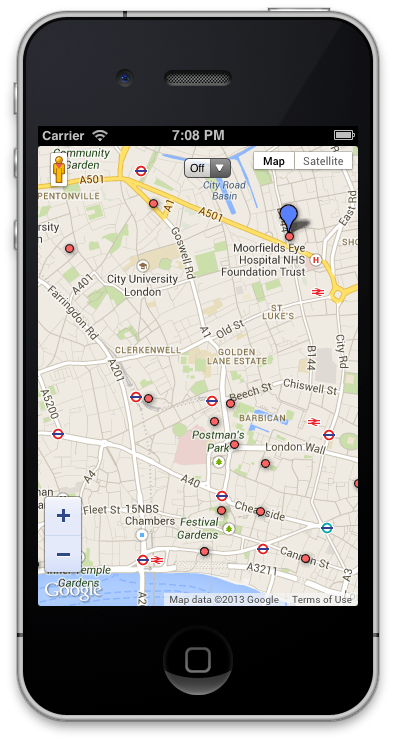This is a necropost, resurrected from an old blog. To find out more about Hack the Police events, civic tech, and policing technology, visit: Police Rewired
AroundMET
Emergency services need to find things in a hurry!
That may seem obvious to you.
This hack was mine - and it’s something I’ve been trying to put together for a while now. As I was running the event, I didn’t have all the time in the world for coding - so I stuck to what I know best: Maps

I deliberately kept my goals modest, and the product simple. It’s a map. It shows you where you are, and it shows you what you’re trying to find - whether that’s police stations, custody suites, defibrillators, or other locations of interest to police officers on the front line.
Defibrillators are everywhere
Did you know there are over 1,300 publicly accessible emergency defibrillators distributed around London?
As it turns out, the act of wearing a police uniform does not automatically bestow on a person the power to determine where those are.
Hint: if you ever need a defibrillator, run to the largest store or shopping centre you can find, a tube station, a school, or other busy-looking public building.
Information about defibrillators is compiled by the London Ambulance Service and regularly shared with the Metropolitan Police.
What the police has always done with that - up to now - is a mystery.
What we should be doing with it, is providing that data to every front-line officer in a practical format. It will help to save lives and it’s something we can do without risk to personal data or public safety - as all it can do is improve the service we provide.
Sadly, no police force in the UK yet has the capacity to deliver this to their officers. That’s something that various agencies are working on, and hopefully sooner rather than later we’ll begin to see real new abilities in the hands of police officers.
Unplanned work
By building a small, high utility app over the course of 2 days, I aimed to highlight just how much more the police service could achieve if they had the capacity to perform unplanned work.
As we see across industry: Apps come and go. Some of them prove to be staggeringly useful to many, others only to a handful, and some to none. But they are also very low risk because they are so quick and easy to produce. They cost little to make when you have the skills in your organisation to do that, and are quick and easy to adapt when new requirements come along. Often, it’s important to be able to move quickly and respond to changes in expectations. By being able to deliver these things for themselves instead of relying on large contractors police forces can cut costs and increase public confidence quickly and easily.
Through current means, however, that’s not possible. Police services build business cases and hire expensive contractors to provide complex systems that still, somehow, seem to meet few of their needs. They are locked into service contracts that limit their options and make prohibitively expensive even the smallest pieces of work.
Police services in the UK can seize the opportunity to work much faster and better. To do so, all they need do is employ a few staff with development skills instead of following the traditional approach of expensive and slow contractual work. This provides them with the ability to act swiftly whenever they needed new work - regardless of what’s required. It’s an absolute certainty that there’s enough work across any police force to employ several developers on continuous improvement.
There’s work to be done to change hearts and minds at the core of policing that this is a smart approach that will yield rewards. That work is under way.
To find out more about Hack the Police events, civic tech, and policing technology, visit: Police Rewired

